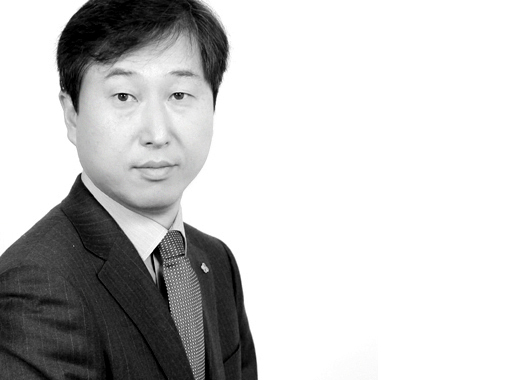Bibigo at the vanguard of hansik’s globalization
Chief of CJ’s hansik brand calls for stronger government support to promote Korean food
By Korea HeraldPublished : June 9, 2013 - 20:35
Korean cuisine, or hansik, is on the front burner in major cities around the globe, with kimchi and bulgogi adorning the menus of top, modern restaurants in New York.
But it is still rare for non-Koreans to cook or eat hansik at home as they might with Japanese or Chinese.
As part of efforts to add hansik to the carte du jour of cosmopolitans, CJ CheilJedang exports Korean food products such as traditional fermented condiments and frozen dumplings under the brand Bibigo to the U.S. the U.K., China, Japan and Singapore.
“We plan to expand from North America to South America, from the U.K. to France and Germany, from China and Japan to Indonesia and Vietnam,” Yu Je-hyeuk, chief of the Bibigo division at CJ CheilJedang, said in an interview with The Korea Herald.
But it is still rare for non-Koreans to cook or eat hansik at home as they might with Japanese or Chinese.
As part of efforts to add hansik to the carte du jour of cosmopolitans, CJ CheilJedang exports Korean food products such as traditional fermented condiments and frozen dumplings under the brand Bibigo to the U.S. the U.K., China, Japan and Singapore.
“We plan to expand from North America to South America, from the U.K. to France and Germany, from China and Japan to Indonesia and Vietnam,” Yu Je-hyeuk, chief of the Bibigo division at CJ CheilJedang, said in an interview with The Korea Herald.

“We are currently exporting ‘jang’ (traditional fermented pastes such as gochujang, doenjang, ganjang and ssamjang), ready-made rice products called Hetbahn, bulgogi sauces, gim (cooked seaweed) and frozen dumplings. We plan to develop more frozen hansik products such as tteokgalbi (grilled meat patties) and bulgogi that foreigners can enjoy conveniently at home.”
CJ runs a dual sales system for overseas Koreans and the mainstream local consumers.
“We target the ‘gyopo’ (ethnic Koreans abroad) market with CJ’s existing brands such as Beksul and Haechandle, while we tap the mainstream consumers with the Bibigo label,” Yu said.
“Dumplings and marinades such as Korean bulgogi BBQ and stir-frying sauces are the best-selling products in the mainstream markets. Dumplings are popular in the U.S. and the U.K. while bulgogi marinades sell well in Japan.”
CJ also runs a bibimbap (steamed rice mixed with vegetables and meat) restaurant chain of the same name.
The Bibigo restaurants opened in the five countries where Bibigo’s processed food products hit store shelves as CJ unrolls a simultaneous marketing strategy for the two businesses.
“One of our strategies to create synergy between the two is to put some of the processed foods on the restaurant menus. The Bibigo restaurants are being used as the test beds for the Bibigo products. Our restaurants in Japan, for instance, have launched menus that use Bibigo’s bulgogi marinade sauce,” the executive director said.
The Bibigo restaurants also have a section where the processed foods are displayed and sold.
Some of the popular menus and ingredients used at the restaurants are made into processed foods as well.
Bibigo sees the largest sales in the U.S., which has the greatest demand for Asian food among the company’s export destinations.
It started with dumplings as they are well liked as appetizers and party food.
“Our Korean-style dumplings with thinner skins and more vegetables are selling well. They are sold in about 250 Costco stores in the U.S. where we expect 24 billion won ($21.5 million) in sales this year,” Yu said.
“The ‘healthy’ Bibigo dumplings, which have thinner skins, contain less meat and are less greasy than Chinese dumplings, are also in high demand in southern China and Hong Kong where dumplings are a staple food.”
Bibigo products entered global retail outlets such as Tesco and Costco through successful “demo” events. Only products that gained positive consumer response and sales results were offered a regular spot on the store shelves.
Bibigo’s “mini wontons,” for example, formally entered Costco in 2010 after receiving favorable customer reviews and results at a demo event in 2009.
Bibigo’s wontons, marinades and gim became Tesco’s regular products last October after drawing good response at “The Taste of Korea” event hosted by the Korea Agro-Fisheries and Food Trade Corporation in 2011 and 2012.
Bibigo also received an annual “Supplier of the Year” award from Tesco in May.
“While keeping the authentic taste of hansik, Bibigo tunes into modern ways and trends for presentation of the menus, restaurant interior designs and the assemble-to-order system to help local consumers enjoy the food more easily,” Yu said.
“But even if we push for various strategies to globalize hansik, it takes decades to disseminate a culinary culture to foreign countries. This is why the government’s policy support to promote hansik is crucial.”
Yu mentioned the Korea Tourism Organization’s latest television commercial featuring K-pop musician Psy as a good example.
“As of yet, Korean food is enjoyed by minorities in most parts of the world. In order to allow people around the world to embrace hansik as naturally as Japanese, Chinese or French cuisine, and learn about hansik and its superior qualities, the government must take the lead in investing in TV and outdoor advertising campaigns as well as formal events,” he said.
“The Thai royal family, for instance, hosted cooking classes and invited foreign press to promote Thai food. We need this kind of government-led campaign.”
Bibigo targets 600 billion won in overseas combined sales of its processed food and restaurant businesses by 2017.
It aims to increase the number of grocery stores that sell Bibigo products from the current 3,000 to 4,200 by then.
By Kim So-hyun (sophie@heraldcorp.com)
-
Articles by Korea Herald










![[Robert J. Fouser] Social attitudes toward language proficiency](http://res.heraldm.com/phpwas/restmb_idxmake.php?idx=644&simg=/content/image/2024/05/16/20240516050799_0.jpg&u=)
![[Graphic News] How much do Korean adults read?](http://res.heraldm.com/phpwas/restmb_idxmake.php?idx=644&simg=/content/image/2024/05/16/20240516050803_0.gif&u=)






![[Herald Interview] Byun Yo-han's 'unlikable' character is result of calculated acting](http://res.heraldm.com/phpwas/restmb_idxmake.php?idx=652&simg=/content/image/2024/05/16/20240516050855_0.jpg&u=)
